24th March 2016 Minsk, Belarus
6 weeks later
It has been just over eight weeks since my arrival and about six weeks since my last blog – perhaps that’s a sign of how busy a time it has been. I’ve met Ministers, opposition leaders, civil society representatives, journalists, been to Vilnius for a conference, talked to students, listened to businesspeople, and of course, attended receptions as all diplomats must do (though no Ferrero Rocher in sight). I’ve only just got round to unpacking my possessions to make my flat “above the shop” a bit more homely. But it has all been good and fun and interesting. What is difficult is picking out a few highlights.
Among all the happy moments was a morning spent at private language school The Mulberry Club, where I was asked to spend some time talking to the children who attend English language classes on Saturday mornings. The group of 8-14 year olds were tongue-tied at first, but then questions began to flow, from what my favourite season was, to if I had a pet, to what differences I noticed between Belarus and the UK (not surprisingly from a diplomat’s daughter) – the morning ended with a karaoke session and me gustily singing and swaying along with them all to Will Farrell’s “Clap if you’re happy”.
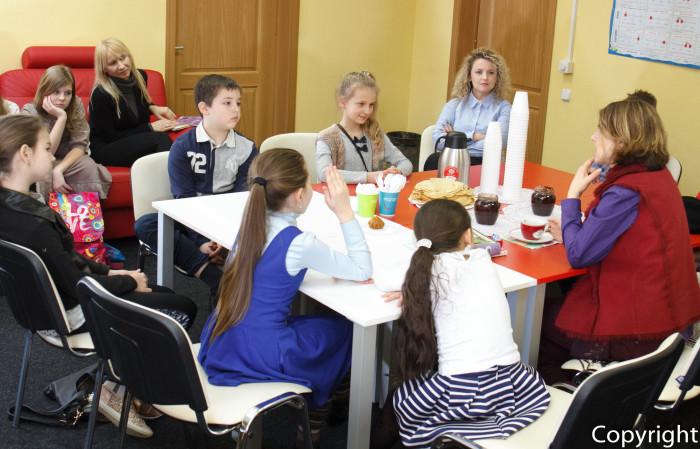
I think there is a great appetite for education here which is really encouraging. I remember being rather dismayed to read, when researching for a speech, that recently published OECD research puts the UK at the lowest among developed countries for literacy. But the UK should be proud of its reputation for excellence in higher and further education and it was therefore a real pleasure for me to be able to hand out Chevening certificates for graduates who have successfully completed Masters programmes at UK universities – and this year there is funding for about 6 scholarships, which is great news.
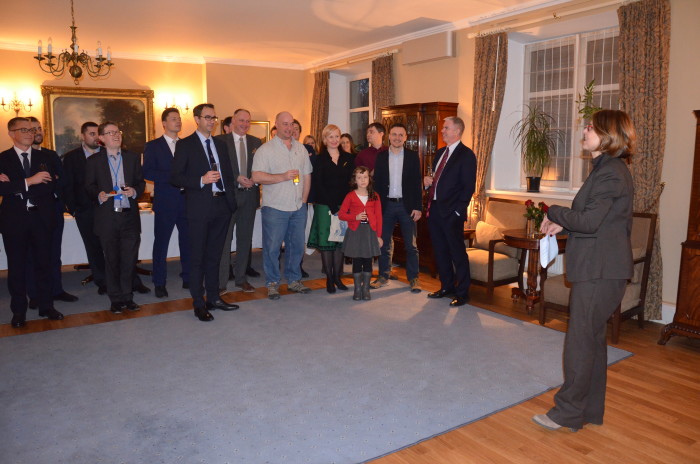
Another positively inspiring event was to attend the opening of the Dotyk Festival at Korpus8 – a building that used to be a TV factory and which has been turned into a two-story creative hub through the vision of 27 year old Vadim Zhuk – helped by crowd funding. The place itself reminded me of abandoned factories morphed into nightclubs in 90s former east Berlin. The festival is in its second year, with the key purpose of fighting discrimination in all its forms. Looking around room full of young people with edgy outfits and haircuts and haircolours, you could have been anywhere in the world. We showed the film “Pride”.
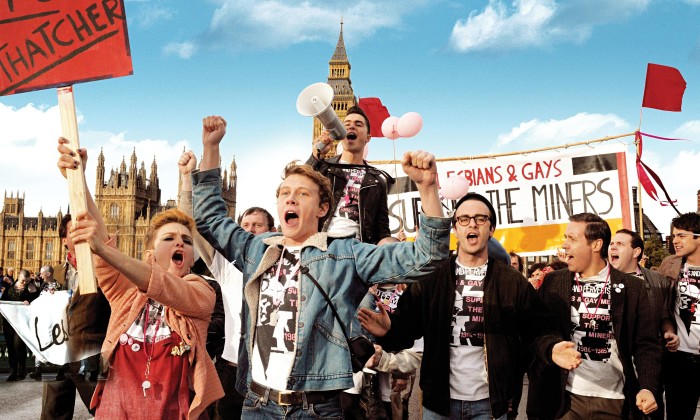
Back at the Embassy, we were delighted with the productive visit of the FCO’s Director General (Policy) Simon Gass, who came on 9-10 February and who was the most senior FCO official here in years, hopefully paving the way for more senior visits this year. Simon packed a lot into his short visit and it was great for me as a new Ambassador to get to meet senior figures in the government at such an early stage in my time here.
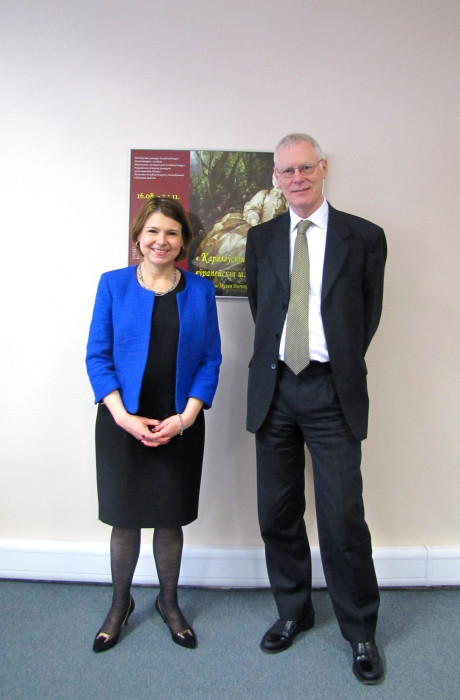
There has also been time for poetry – the MFA hosted International Mother Language Day by celebrating the work of national poet Yanka Kupala, who wrote in native Belarusian. A variety of diplomats were invited to read a pre-selected poem. My UNDP colleague carefully transcribed his poem into his native Sri Lankan so he probably sounded quite plausible when he read his. I stumbled through mine, drawing on distant reserves of Ukrainian (as the two languages are quite close). I silently applauded our hosts for keeping a straight face and being so gracious in praise despite our mangling of the beautiful Belarusian language. I wonder if I would be so gracious in praise when someone other than a native Scot attempted to read Robert Burns …
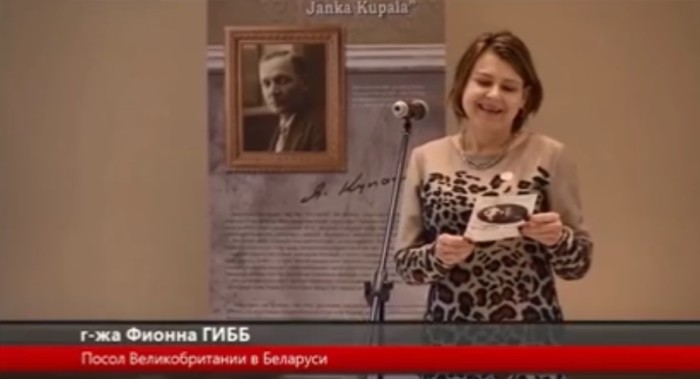
The events we organised around the 23rd Minsk International Book Festival, on our chosen theme of “creativity” provided great entertainment – thanks in large part to the Energetic, enthusiastic and humorous participation of our guest Ben Tallon, illustrator and art director, who came to Minsk to share his experiences. (If you get a chance, do read his book “Champagne and Wax Crayons”.) His drawings sessions at our stand attracted quite a crowd, as did his talk at the Y Gallery and exhibition of his work at Korpus8, many of them fresh on the canvas from quirky details of life he had observed in his strolls around Minsk during his short visit.
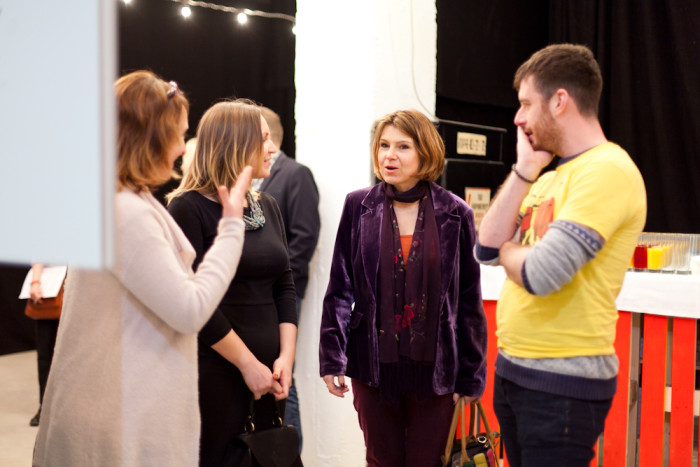
Another highlight of course was the tradition of International Women’s Day – something still celebrated here and which for us the closest thing would be Mother’s Day. But it’s a national holiday and taken most seriously indeed. The Embassy was closed, but the day before all the female staff, myself included, were invited to the reception hall by our male colleagues to receive flowers and chocolates. In fact, I received several bouquets and cards from other Embassies, which was very nice indeed. On 11 March I hosted a lunch for about fifteen women from different walks of life, from a former prize winning gymnast to a photographer to a businesswoman. Most of them, interestingly, did not feel any form of discrimination against women here, but they did complain about working women being expected to do everything at home too, rather than men sharing the burden. (Do I detect many women out there nodding in agreement?) For some women it was not such a happy day though – I met brave and resilient women at a women’s shelter – a small privately funded haven for up to 13 women. They agreed that an important first step would be for Belarus to criminalise domestic violence (a law is in draft), but it was equally important to train police and courts in how to handle such cases sympathetically and sensitively – and not to suggest, as one judge did, that it was merely a brief quarrel and the woman should return to her husband.
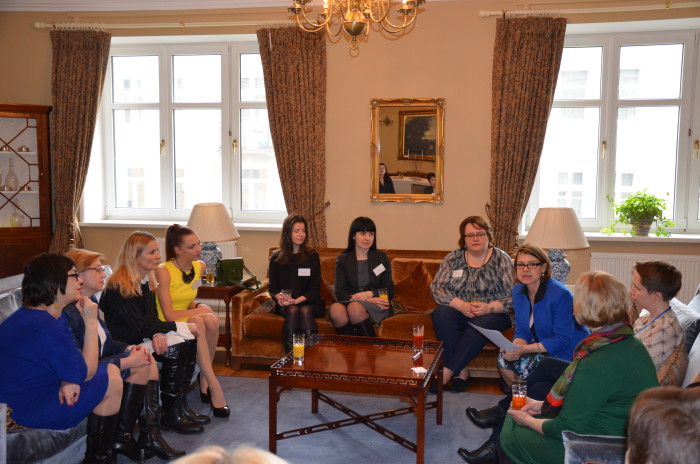
Staying on the theme of laws, we were pleased to be able to fund the first ever Conference on the Death Penalty on 10 March, organised by the Government of Belarus and UNDP. Belarus is the last European country to still use the death penalty. The EU is calling for a moratorium as a first step towards full abolition, but opinion is still divided in Belarus, where a referendum in 1996 showed that the majority view was in favour. But that was twenty years ago and times have changed. There is now the possibility of life sentencing, which was not a category of punishment available at the time of the referendum. The EU Special Rapporteur for Human Rights, Stavros Lambrinidis, made the case for abolition eloquently and persuasively. It was a milestone event and we hope will pave the way for further dialogue. It would be good to hear what our viewers’ opinions are on this sensitive issue.
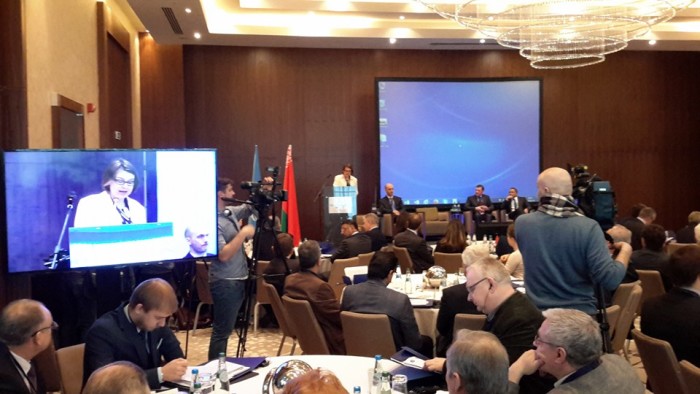
It has not been all work though – those who know me know how I enjoy sport and, apart from swimming, jogging, a spot of horseriding and cycling (I was later told it is against the law to cycle in the snow …) I have even been downhill ski-ing in flat Belarus – there are two hillocks outside the city and much is made of them by those determined to get in a few short runs. I was forewarned by my US colleague who was kind enough to take me, but it was a great way to spend a few hours on a weekend morning.
A moment to pay tribute was the day I was honoured to hand out posthumous medals for WWII service to the descendants of brave Belarusians who joined the Polish II Corps, part of the Polish Armed Forces after the end of the Nazi-Soviet pact in 1941, when Poles and Belarusians from the Soviet-occupied Poland were released from labour camps or exile in Siberia. The Corps became an independent part of the British Eighth Army under General Leese in Italy, taking part in the Italian campaign, most notably during the fourth and final Battle of Monte Cassino, the Battle of Ancona and the Battle of Bologna during the Allies final offensive in Italy in March 1945. After demobilisation in 1947-8, some of the former servicemen returned to their homes in Belarus, but were never recognised as WWII veterans in the USSR. In 1951 most were exiled with their families to Siberia for their service under British command and were not fully rehabilitated until 1991, by which time many had died. So it was a great honour, along with the Polish Charge d’Affaires, to be able to present the service medals, awarded by our Ministry of Defence, to the families of these men. For them it was a very moving occasion and they were deeply proud that their forebears had been recognised in this way.
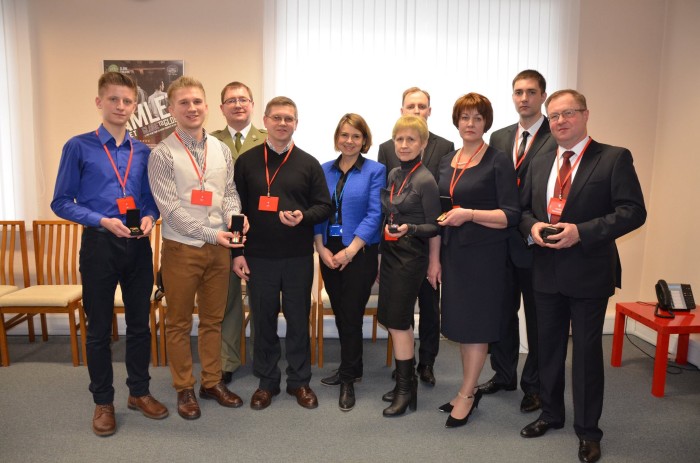
There’s also been time for Entertainment – Minsk is a city of many theatres and I’ve already been to the National State Opera and Ballet, the Yanka Kupala theatre, the Sports Palace, the Palace of the Republic, the Philharmonia, the Concert Hall and the Officers House for theatre, classical guitar, jazz, WWII songs, ballet and, most recently, Verdi’s Macbeth. I felt very trendy attending the concert of synth-pop Manchester duo “Hurts” at the Sports Arena. I even got backstage before the concert and met the charming manager Neil and charismatic singer Theo Hutchcraft– this was around the fifth time Hurts had played in Minsk and they loved the vibe and the reception they always got. I was among a crowd with an average age of 25 perhaps, but in the dark I thought I probably wouldn’t stand out too much … it was a great concert and I am now a big fan!
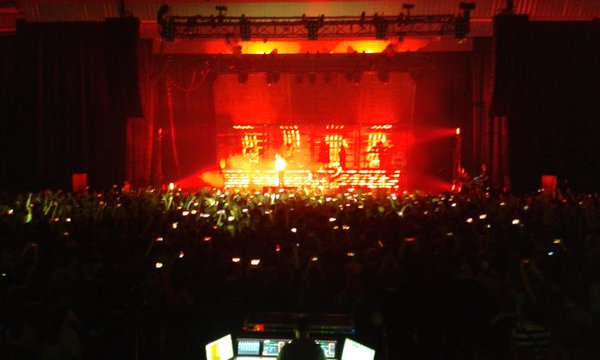
Finally, a moment of Remembrance. Last Friday 18 March I was privileged to attend Shabbat with ghetto survivors and other members of the Jewish community. We gathered in a low one story wooden building that, together with another wooden house alongside, are all that is left standing from those days. If those walls could speak …The landscape around is now unrecognisable and has been totally rebuilt. I shared a table with a lady in her seventies who had been a young child during the ghetto years and whose mother had been hanged by the Nazis. Her brother had escaped with her to the forests outside the city and they had survived there. The indominable Frida, in her 80s, told us as we drove her home afterwards what had originally stood in the places we were passing, where the “stream of blood” had flowed and where bodies had been thrown. The Shabbat itself was a happy occasion and when juice and falafel were served, I got a very positive response from my ladies when I said next time I would bring red wine .. they were full of smiles and welcome and amazing stories of endurance through hardship. When the fiddler and clarinetist, entertaining us with some wonderful klezmer music, went on to play the hauntingly moving theme tune from Schindlers List, the room went totally still as people were lost in thought.
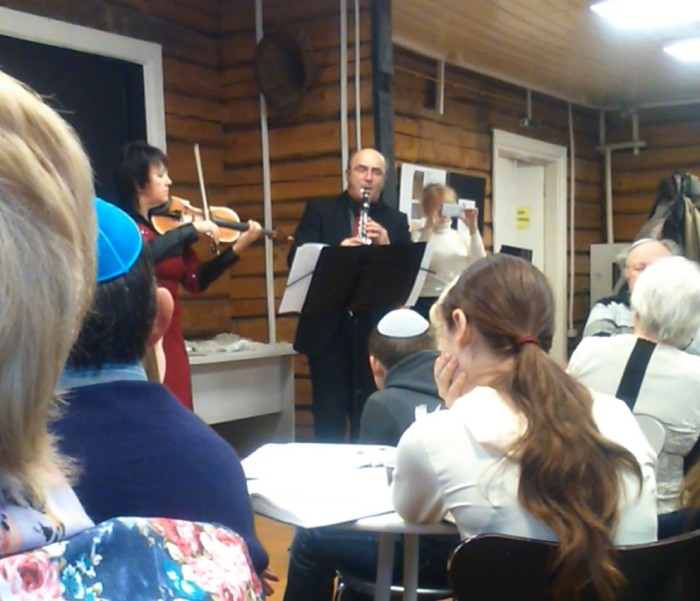
I write this the day after the terrible terrorist attacks in Brussels. Our flag is at half-mast in tribute and remembrance of these latest innocent victims of a different but equally deadly and abhorrent creed.
Happy Easter, all.
Great blogging Fionna. It’s amazing the things that you are involved with- I’m glad the WW2 veterans’ families got their medals. International women’s day good event too. Love the photos. Jenny xx
Great to hear from you! Thanks for the comments. I decided I couldn’t come back in April as it’s a bit early but planning to be in the UK in early July for sure and will see you then. Spent last week in Ukraine and visited a museum in Lviv where I took a photograph for Billy of an old 18th-century clock, will send it to you!
Happy Easter Fionna, Lovely to read all about your life. It sounds amazing. If you are still coming over in April it would be great to see you. All well here we hope to see Deidre in two weeks time. Lots of love Pat and Bill xxx